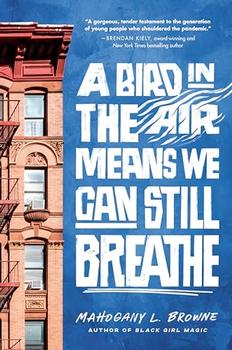Summary | Excerpt | Reviews | Beyond the Book | Readalikes | Genres & Themes | Author Bio

First, we were told it was a new strain of flu. One that made your chest fill up with water and mucus. One cough and the fire would plant a little firecracker seed in the base of your neck. In two days, the seed sprouted and began to crawl up your spine into the back of your skull and stretch all its legs across your brain. The adults thought this new strain would only affect old people and poor people. Only some of them were upset. But the ones who stood outside of senior citizen homes with handmade signs and teary faces weren't upset; they were devastated. The news would plaster this picture on the screen and run every couple of hours. It was like a warning for us to stay home. The warning only seemed to work on people who cared about the elderly. Turns out, the president--my mama called him "that mean man"--was on the television screen with a red tie and orange face, instructing people to do homemade science experiments on themselves.
I asked Mama, "Why is he so mean? What's the difference between him and the rest of the people in charge?" She stopped cooking slices of turkey bacon on the stove and looked in the corner like the answer might live between the pop and the sizzle of our breakfast.
"He abuses his power. He told people to inject bleach to kill the virus! Like it was a joke." She scoffs. "What did I tell you about cleaning supplies?" She goes back to tending to the sizzle on top of the open fire.
"No drinking cleaning supplies," I chant like a song I don't like but know by heart because it plays on the radio every hour of every day.
"Malachi, I taught you that in kindergarten," she exclaims, shaking her head. "It's like some folks forgot the basics and just listen to anything these days. But they can't see--anyone who makes hate speech is doing it for profit, and money doesn't care about the sick--as long as the bottom line isn't affected. You just watch. This kind of talk ain't no different than what your great-great-grandfather went through when they tried to take his land and his dog back in Louisiana. He prevailed, and we kept that land in the family despite them trying to ruin the soil and spoil the crops. People like that only listen to one thing: money. This is just the beginning!"
She balances her weight on her bad foot. You can tell it's bad because it's the only foot that swells like a bag of potato chips that's been in the bodega window too long. She shifts her weight and keeps talking. "In other places around the world, this sickness is happening, and no one is being forced to work. They are allowed to take care of their families and their health. But not this so-called leader. Oh no, he wants us back at work as if money is more important than people."
I nod like I understand, but I don't understand any of this, not really. As far as I could tell, Brooklyn has always been this way. Some rich people live there, and right across from them are ready-made millionaires in public housing. We all go to the same bodega. We all order from the same Chinese food spot. I just thought some of us got a doorman and some of us got a cigarette lady welcoming us home. But Mama is kind of telepathic because she answers the thoughts in my head.
"You may not notice the difference now. But as you grow older, you will see the difference, soon enough. Just keep your eyes open. See everything."
And just then the man with the worst advice ever says take a daily dose of a drug that people with lupus need. And I had to look it up for a research paper back when we were still in virtual school. A six-syllable word that made everybody catch their breath: hydroxychloroquine. It costs so much people started selling their food stamps for half the price, just to afford a month's supply. The manufacturers and bootleggers were selling it under the counter, online and rationing it out like it was water in a desert. Then the bootleggers began to see unprecedented profits and decided to split the drug with other substances to make it stretch, so they could make even more money.
Excerpted from A Bird in the Air Means We Can Still Breathe by Mahogany L. Browne. Copyright © 2025 by Mahogany L. Browne. Excerpted by permission of Crown Books for Young Readers. All rights reserved. No part of this excerpt may be reproduced or reprinted without permission in writing from the publisher.
Your guide toexceptional books
BookBrowse seeks out and recommends the best in contemporary fiction and nonfiction—books that not only engage and entertain but also deepen our understanding of ourselves and the world around us.